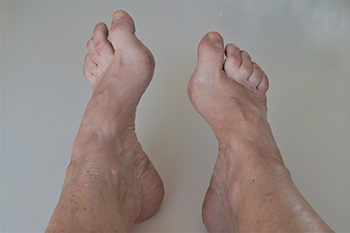
Dealing with high foot arches, medically known as cavus foot or pes cavus, can present challenges and discomfort. Unlike flat feet, where the arch is too low, a cavus foot has a higher-than-normal arch. This can result in foot pain or more severe problems. The causes of cavus foot are diverse, including a genetic predisposition as well as biomechanical or neurological factors. Conditions like cerebral palsy, spina bifida, or stroke may contribute to its development, necessitating a professional diagnosis to determine the root cause. Symptoms include a conspicuous high arch while standing, inward heel tilting, and weight distribution that favors the ball of the foot and heel. Toe clenching, calluses, and pain in the top and middle foot areas during walking or standing are also common. Shoe fitting challenges and frequent ankle sprains due to imbalance also characterize high arches. Surgery is reserved for extreme cases when non-surgical remedies, such as custom orthotics, prove ineffective. If you believe that you have high foot arches that are causing problems, it is suggested that you make an appointment with a podiatrist for treatment options.
If you have any concerns about your feet, contact one of our podiatrists from Montgomery Foot Care Specialists. our doctors can provide the care you need to keep you pain-free and on your feet.
Biomechanics in Podiatry
Podiatric biomechanics is a particular sector of specialty podiatry with licensed practitioners who are trained to diagnose and treat conditions affecting the foot, ankle and lower leg. Biomechanics deals with the forces that act against the body, causing an interference with the biological structures. It focuses on the movement of the ankle, the foot and the forces that interact with them.
A History of Biomechanics
- Biomechanics dates back to the BC era in Egypt where evidence of professional foot care has been recorded.
- In 1974, biomechanics gained a higher profile from the studies of Merton Root, who claimed that by changing or controlling the forces between the ankle and the foot, corrections or conditions could be implemented to gain strength and coordination in the area.
Modern technological improvements are based on past theories and therapeutic processes that provide a better understanding of podiatric concepts for biomechanics. Computers can provide accurate information about the forces and patterns of the feet and lower legs.
Understanding biomechanics of the feet can help improve and eliminate pain, stopping further stress to the foot.
If you have any questions please feel free to contact our office located in Montgomery, AL . We offer the newest diagnostic and treatment technologies for all your foot and ankle needs.
